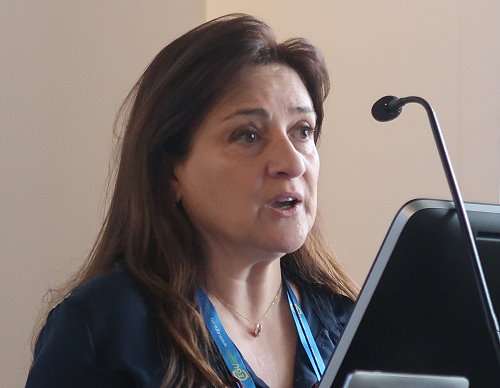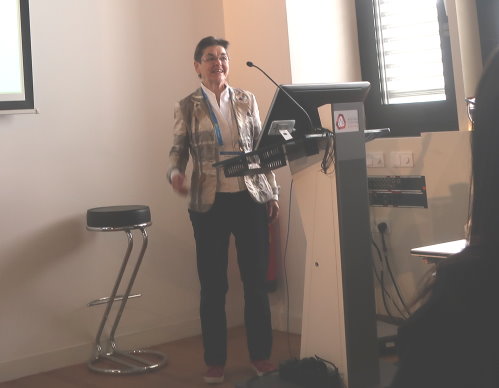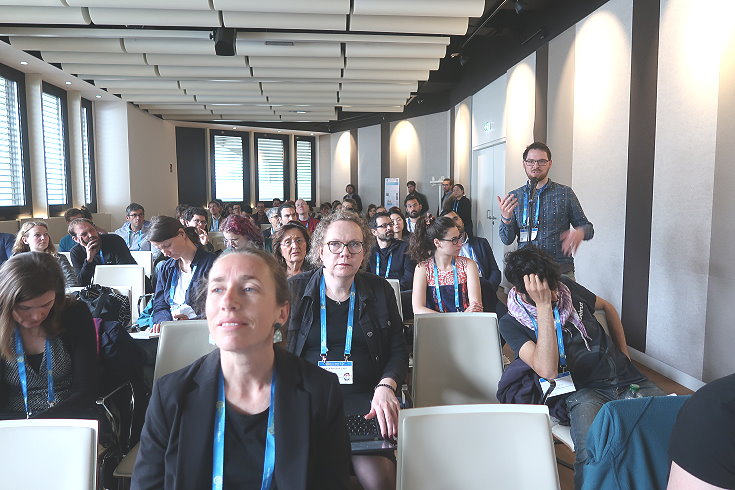The beginnings of geoethics about a decade ago initiated by Silvia Peppoloni and Giuseppe Di Capua, geologists from Rome, were rather whimsical. The geoethics work stream at the 2023 Annual Assembly of the European Geosciences Union (EGU) in Vienna has grown into a full day’s programme. Mundus maris has repeatedly contributed to this encouraging development both at EGU conferences and in associated books projects. This year there were even several presentations reporting on field work and experiences on how to account for a range of different ways to express knowledge, inside and outside of scientific epistemologies.

Following on from Beth Fox’s account about the challenges of interdisciplinary studies and Fiona Johnson’s presentation of social production of ignorance of administrations and mining companies in the face of indigenous knowledge and nurturing for nature in remote areas of northern Australia, Cornelia E Nauen of Mundus maris spoke about art of hosting technologies to enable dialogue between people with very diverse backgrounds.
In the face of overlapping crises the need for such approaches that focus on looking jointly for solutions by bringing together a diversity of experiences, views and professional backgrounds in a safe and respectful dialogue space is particularly great. Scientists estimate that the mass of human artefacts now exceeds the biomasses of plants and animals. Life on the planet is thus on a dramatic retreat compared to the technosphere humans are replacing nature with. What does that mean for our own living spaces that are dependent on nature and functioning marine and terrestrial ecosystems?
The observation of industrial fishing activities from space shows that fisheries are operating in 55% of the ocean, in some areas such as around Europe and China particularly intensely, including by highly destructive gears, such as bottom trawls. These destroy critical habitats for bottom dwelling species and emit copious amounts of CO2 probably even superior to those of the aeronautics industry.

The investigations are published in the scientific literature, potentially accessible to many. But we observe that it normally takes a long time, decades or even more than a century, before scientific results and insights are appropriated by societies at large. These are often the timeframes needed in the ‘normal course of things’ before the multifarious impacts of scientific results become apparent in many people’s lives as they are translated into new technologies or medical applications, some risky or even negative, some very positive.
It has been said that the mindset creating the human-made disasters is not going to undo the damage. Listening to a wider range of voices thus is a logical step towards dealing with such bad decisions and even averting the disasters by timely exploration of several alternative ways to address a need or a problem. The many dialogue formats summarily known as art of hosting technologies have been shown to work in very different contexts. Mundus maris practiced some in a mixed academic setting as early as 2014 and found the principles to work well too in the Small-Scale Fisheries Academy.
We are running out of time and need a broader ‘tool kit’ how to deal with these overlapping crises – pulling all the knowledge of the natural and human sciences together with the wisdom of crowds. The slides are available here and the abstract in print format can be accessed here.

Academia de Pesca en Pequeña Escala
- Make Fishing Fair in the EU, 25 March 2025
- Human – Biodiversity Relationships Across Scales
- World Fisheries Day, 21 November 2024, celebrated in Nigeria
- Mundus maris participated in the 2024 World Fisheries Day organized by Canoe and Fishing Gear Association of Ghana (CaFGOAG).
- Mundus maris contribution to the UNOC3 public consultation
- Cumbre de pesca en pequeña escala en Roma, del 5 al 7 de julio de 2024
- Regional Symposium on European Small-Scale Fisheries, Larnaca, Cyprus, 1-3 July 2024
- Baltic Fisheries Emergency Meeting, Brussels, 26 June 2024
- Ambivalent role of Market and Technology in the Transitions from Vulnerability to Viability: Nexus in Senegal SSF
- Shell fisheries as stewardship for mangroves
- African edition of 4WSFC in Cape Town, 21 to 23 November 2022
- World Fisheries Day, 21 November 2023
- Webinar: Retos y oportunidades de la pesca en Nigeria
- Presentación de la aplicación FishBase en el Simposio de Tervuren
- Conferencia MARE sobre Miedo Azul – Mundus maris reflexiona
- The Transition From Vulnerability to Viability Through Illuminating Hidden Harvests, 26 May 2023
- EGU sessions focused on geoethics and joint learning, 23-28 April 2023
- Solidaridad con los pescadores artesanales de Senegal y Mauritania
- The legal instruments for the development of sustainable small-scale fisheries governance in Nigeria, 31 March 2023
- Tools for Gender Analysis: Understanding Vulnerability and Empowerment, 17 February 2023
- Community resilience: A framework for non-traditional field research, 27 January 2023
- Sustainability at scale – V2V November webinar
- Edición europea del 4° Congreso Mundial de Pesca Artesanal (inglés 4WSFC) en Malta, 12-14 de septiembre de 2022
- Mundus maris contributes to SSF Summit in Rome
- La Academia en Yoff continúa trabajando
- Illuminating the Hidden Harvest – a snapshot
- Evento de lanzamiento virtual FAO: Año Internacional de la Pesca y la Acuicultura Artesanales
- The Small-Scale Fisheries Academy as a source of operational support to PA Guidelines
- Congreso Mundial de Pesca, Adelaida, 20-24 de septiembre
- Mundus maris apoya la lucha de Paolo, el pescador, en la Toscana, Italia
- Catching-up – SSF Academy Yoff, 27 Febr. 2021
- Fortalecimiento de las capacidades de los implicados en la pesca sostenible a pequeña escala
- Probar métodos de capacitación durante la fase piloto de la Academia PPE en Senegal
- Un estreno: lanzamiento de una Academia de pesca en pequeña escala en Senegal
